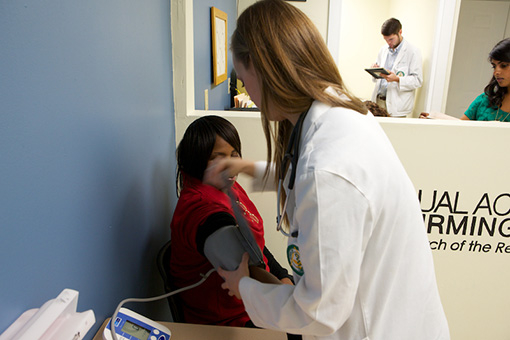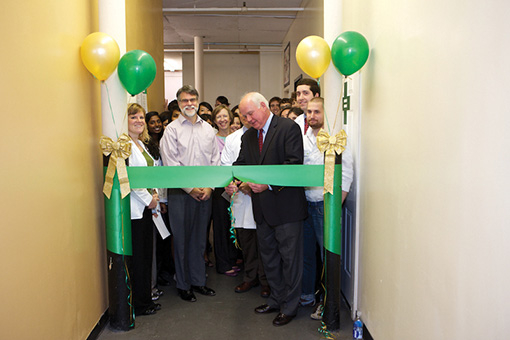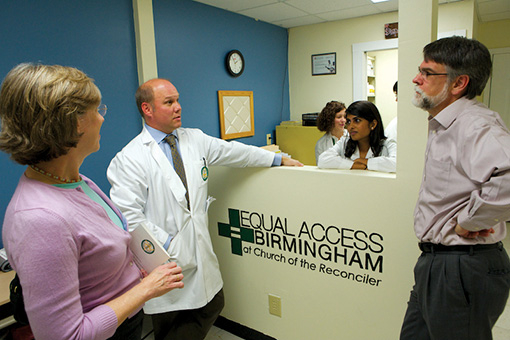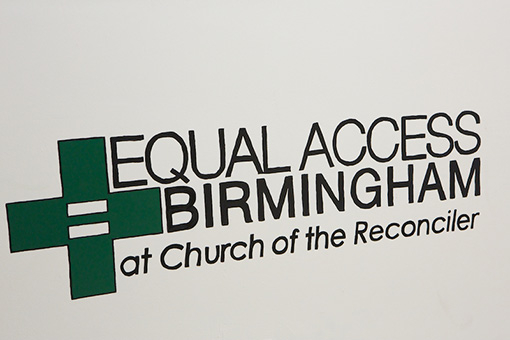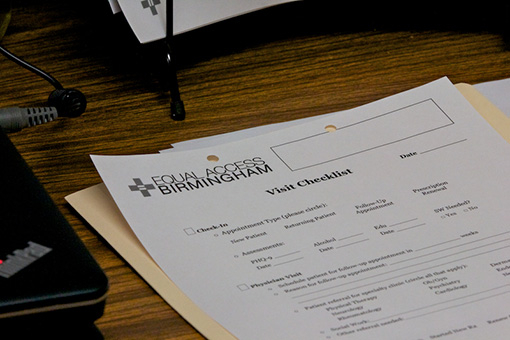Student-Run Equal Access Birmingham Opens Its Own Clinic
By Matt Windsor and Meghan Davis
 Equal Access Birmingham is a student-run
Equal Access Birmingham is a student-run
organization that provides acute care to
medically underserved patients in several
locations in Jefferson County. In November
2012, the group opened its own clinic at the
Church of the Reconciler only a few blocks
from the UAB campus. Here, EAB leaders
prepare for the opening of the new clinic. Since 2007, Wednesday nights for many UAB medical students have meant a short drive to the M-POWER Ministries health clinic in Birmingham’s Avondale neighborhood. Under the supervision of faculty physicians, the doctors-in-training provide acute care for the medically underserved patients at M-POWER’s free walk-in clinic. But they wanted to do more.
Demand for slots had grown so strong that many students could only take part a few times per year. So the students, who have run their own organization, known as Equal Access Birmingham (EAB), since 2005, decided to open their own clinic, closer to campus.
In November 2012, with money earned from a School of Medicine variety night known as the Best Medicine Show, plus matching funds from then-dean Ray L. Watts, M.D., EAB completed its mission. The new student-run clinic, just a few blocks from campus at the Church of the Reconciler, provides long-term care to underserved patients in the Jefferson County Housing Authority Shelter Care Plus program. EAB also will continue to staff the M-POWER clinic.
Second-year student Nishi Shah, the EAB clinic director, says she “wanted to get involved with EAB ever since I got accepted to UAB.” She devotes 20 hours a week to clinic business, seeing patients every Sunday afternoon and spending much of the week making sure the clinic is prepared to run smoothly the following weekend. “Every clinic day is completely different from the one before,” Shah says. “No two patients are the same.”
(Story continues beneath the slideshow)
The best part about finally having “our own place is that we can tailor the clinic to whatever experience that we want,” Shah adds. “We wanted to make it as much of a typical primary care clinic as we could. We chose an electronic medical record system, we researched the main medications that our particular patient panel might need, and we created forms that are conducive to our educational goals.”
Sandhya Kumar, a second-year student and diabetes education coordinator for EAB, works about 10 hours per week on clinic projects, mostly recruiting and training diabetes education instructors to volunteer in the clinics, at community health screenings, and at HealthSmart, a community education center in downtown Birmingham run by UAB’s Minority Health and Health Disparities Research Center.
“The one thing that continues to surprise me is how little people know about their own health conditions,” Kumar says. “These patients were never given the proper tools to make good daily lifestyle choices, and our hope with the EAB Diabetes Education Initiative is to provide quality health education and to empower patients to participate in their own health management.”
—Additional reporting by Bob Shepard
More Information
Keep up with the latest EAB events on the group's Facebook page
